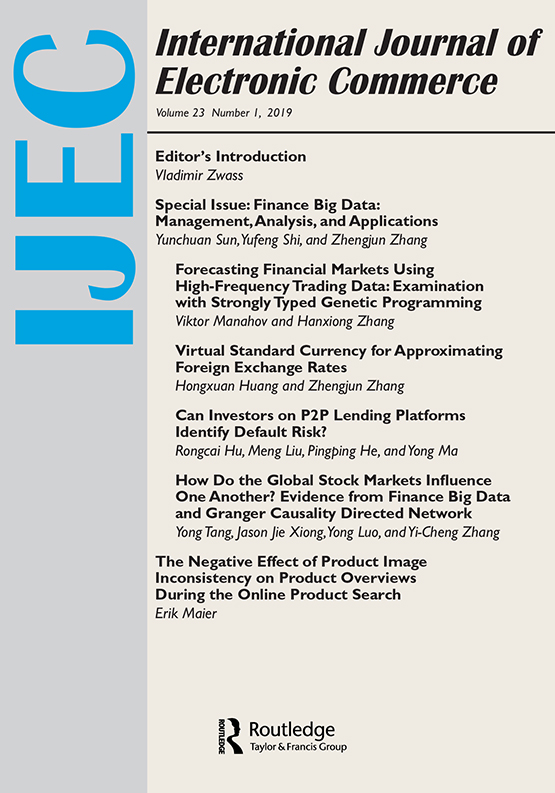在跨侧网络效应下,竞争对手移动电信运营商何时应提供赞助数据计划?
IF 3.8
3区 管理学
Q2 BUSINESS
International Journal of Electronic Commerce
Pub Date : 2023-07-03
DOI:10.1080/10864415.2023.2226902
引用次数: 0
摘要
摘要近年来,作为双边市场平台的移动电信运营商之间的竞争越来越激烈。为了从互联网内容提供商那里获得额外的利润,移动电信运营商通过提供赞助数据计划向互联网内容提供商收取补贴费,其中最终用户由互联网内容提供商补贴数据流量消耗成本。本研究采用博弈论模型研究了跨侧网络效应下竞争移动电信运营商提供赞助数据计划的最优策略。我们发现,当跨侧网络效应较弱(中等、较强)时,两个移动电信运营商(只有一个移动电信载波,两个都不是移动电信载波)将在纳什均衡中提供赞助数据计划。此外,考虑到赞助数据计划对终端用户总数和每个终端用户平均消费数据流量的增量的影响,我们发现,当赞助数据计划的效果较弱或较强(中等)时,两个移动电信运营商(只有一个移动电信运营商)都会在纳什均衡中提供赞助数据计划。此外,在一定比例的终端用户多归属于移动电信运营商的情况下,我们验证了终端用户的多归属将有条件地使移动电信运营公司受益或受损,这也是一个不同于先前研究的新发现。在终端用户得到部分补贴的情况下,当跨侧网络效应不太大时,较大的移动电信运营商将始终完全补贴终端用户,而较小的移动电信电信运营商可以选择完全、部分或不补贴终端用户。本文章由计算机程序翻译,如有差异,请以英文原文为准。
When Should Competing Mobile Telecom Carriers Provide Sponsored Data Plans Under Cross-Side Network Effects?
ABSTRACT The competition among mobile telecom carriers, serving as two-sided market platforms, is becoming more intensive in recent years. To gain additional profits from Internet content providers, mobile telecom carriers charge subsidization fees to Internet content providers by providing sponsored data plans wherein end users are subsidized by Internet content providers for the cost of data traffic consumption. This study employs a game-theoretical model to investigate the optimal strategies of competing mobile telecom carriers on providing sponsored data plans under cross-side network effects. We find that both mobile telecom carriers (only one mobile telecom carrier, neither mobile telecom carrier) will provide sponsored data plans in Nash equilibrium when the cross-side network effects are weak (moderate, strong). Also, considering the effect of sponsored data plan in terms of the increment in both the total number of end users and the average amount of data traffic each end user consumes, we find that both mobile telecom carriers (only one mobile telecom carrier) will provide sponsored data plans in Nash equilibrium when the effect of sponsored data plan is weak or strong (moderate). Moreover, in the scenario wherein a proportion of end users multi-home to mobile telecom carriers, we verify that end users’ multi-homing will conditionally benefit or hurt mobile telecom carriers, which is also a novel finding different from prior studies. In the scenario wherein end users are partially subsidized, when the cross-side network effects are not too large, the larger mobile telecom carrier will always totally subsidize end users while the smaller mobile telecom carrier may choose to totally, partially, or not subsidize end users.
求助全文
通过发布文献求助,成功后即可免费获取论文全文。
去求助
来源期刊

International Journal of Electronic Commerce
工程技术-计算机:软件工程
CiteScore
7.20
自引率
16.00%
发文量
18
审稿时长
>12 weeks
期刊介绍:
The International Journal of Electronic Commerce is the leading refereed quarterly devoted to advancing the understanding and practice of electronic commerce. It serves the needs of researchers as well as practitioners and executives involved in electronic commerce. The Journal aims to offer an integrated view of the field by presenting approaches of multiple disciplines.
Electronic commerce is the sharing of business information, maintaining business relationships, and conducting business transactions by digital means over telecommunications networks. The Journal accepts empirical and interpretive submissions that make a significant novel contribution to this field.
 求助内容:
求助内容: 应助结果提醒方式:
应助结果提醒方式:


